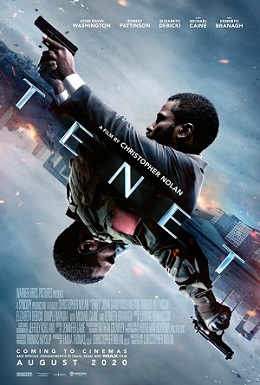
Tenet is the culmination of two decades of the film making behemoth that is Christopher Nolan.
It’s everything you’d expect from him – it’s big-budget, traditionally made, and has a Rubix cube of a plot that perfectly fits together at the end of the two hours and 30 minutes. While Nolan’s films have toyed with various action genres over the years, this has to be his finest try at making a James Bond film (or a Mission Impossible entry) to date.
You’ve got action set pieces that you can easily imagine the suited spy taking part in, but with the added twist of the ‘nonlinearity’ that Tenet brings to the table. Not getting too far into spoilers, Tenet is all about time, and the two directions you can take it in, forward and reverse. This concept works brilliantly in the car chases, fight scenes and grand battles that grace the film, but in fact, is at its best when used to puzzle the audience.
Just like Nolan’s 2006 film, The Prestige was all about misdirecting the audience and characters during grand illusions of magic, Nolan’s charm comes from the various clues he lets the audience glimpse as you’re thrown through the rollercoaster of a plot. Viewers, akin to the amnesiac Guy Pierce in Nolan’s Memento (2000), are kept darting around wondering whether this little nugget they’ve spotted will unlock the meaning of it all, or is it just one more piece of the puzzle? But all that aside, the unravelling of Tenet’s secrets is an enjoyable treat and doesn’t feel rushed in the slightest.
The acting is superb, with Washington doing a great ‘everyman’ role, adding in the wit of a secret agent combined with the dumbfounded confusion at being thrown into various inexplicable situations. Kenneth Branagh ‘s accent is a bit reminiscent of an old Bond film Soviet bad guy, but he has some great angry moments with rather bonkers dialogue. Both Patterson and Debicki have admirable chemistry with Washington, and it’s a shame they don’t get more scenes together.
The cinematography is effective, with lots of close-ups to emphasise the drama, along with some superb fast-moving action scenes which you could easily lose track of without well thought out shots and editing. In this film, Nolan has departed from his usual composer Han Zimmer, but Ludwig Göransson’s score is extremely effective in ramping up the tension and building on the surreal nature of many scenes.
If you love Nolan you’ll love this film, it’s the perfect culmination of his many years of filmmaking, honing all his skills to a massive blockbuster film we rarely see too many of these days. If you don’t, there’s a lot to admire here, and you definitely won’t be wasting any of the two and a half hours in the cinema.